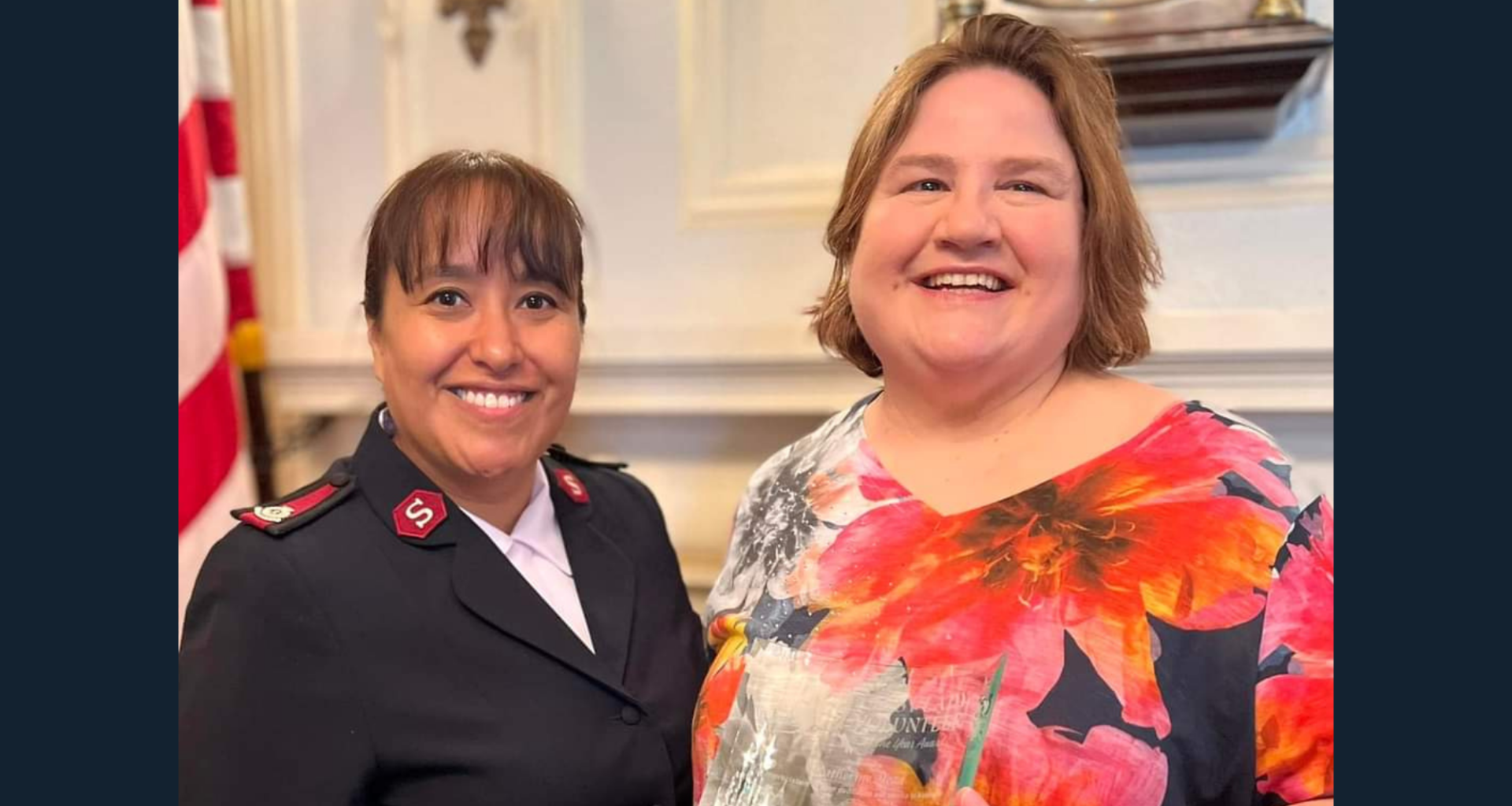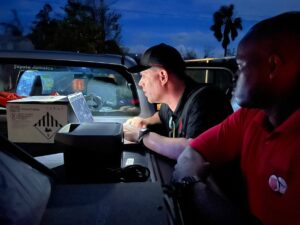Katherine Mead leads efforts to serve up to 60 families a month through the Cordova Extension Unit’s food pantry.
At The Salvation Army Cordova (Alaska) Extension Unit, volunteers run the entire operation, supporting the community that ebbs between 2,000-5,000, depending on if it’s summer, when many take seasonal fishing-related jobs, or not.
“We try to be good neighbors,” said Volunteer Coordinator Katherine Mead, a volunteer herself. “I just have the keys to the building.”
Mead organizes The Salvation Army’s efforts in Cordova, largely focusing on the tasks associated with the monthly food distribution that’s typically held on the third Monday of the month. During that time, some 30-60 families are served.
Her efforts haven’t gone unnoticed—she was recently among the group of seven individuals recognized by Alaska First Lady Rose Dunleavy’s Volunteer Award ceremonial luncheon at the Governor’s Residence in Juneau.
“The Salvation Army in Cordova would not have the capacity to do what we do without Katherine’s support. She really is the backbone of our operation there,” said Jenni Ragland, Alaska Divisional Emergency/Disaster Services and Service Extension Director.
“She cares about people, which I think makes all the difference…We share a common vision and a concern for people. That makes her a really great ambassador, and a really great advocate and a really good partner and friend.”
Mead initially came to the volunteer role after a friend who was in the post, and was moving away, asked her to consider it. At the time, Mead was volunteering with the Volunteer Fire Department, but after serving with the food pantry near the end of 2019, she found she liked it.
She took the keys in early 2020, just before the COVID-19 pandemic.
“At the time we were serving about 20 families,” she said of the monthly distribution. “And then COVID happened in March, so our highest family count that we helped was 154.”
On top of the monthly food distribution, Mead wanted to help make sure that seniors who were potentially at a higher risk of health issues had a way to still access food during COVID, and began delivering food bags to the nearby Sunset View Apartments, senior low-income housing subsidized by the Housing and Urban Development Division (HUD). The effort has continued, and now volunteers make the food-bag deliveries.
“I have a mother and son who go there,” Mead said. “It’s a great socialization for the child and for the elders, and they get to spend time and talk and enjoy those interactions.”
She has also expanded programs at the Cordova Extension Unit to include Angel Tree at Christmastime, providing gifts for children in need, along with participating in The Salvation Army’s Red Kettle campaign, which raises funds for the community.
“It’s really expensive to live in Cordova because…you have the normal expenses but then they tack on shipping,” Mead said, adding that a head of cabbage—a staple of some recipes favored by food pantry recipients—retails for $14.
The food pantry aims to bridge the gap for individuals and families in need.
“If we can provide even just a small amount of food to help support a family, and they can keep their electrical current, their heating oil, their tank filled, whatever, keep a roof over their head because they have access to food, it makes all the difference for them,” Ragland said.
“The Salvation Army in Cordova would not have the capacity to do what we do without Katherine’s support. She really is the backbone of our operation there.”
Jenni Ragland, Alaska Divisional Emergency/Disaster Services and Service Extension Director
The Salvation Army is able to meet feeding needs due to local support and partnerships. Ragland said the food pantry partners with the food bank, and all of the food The Salvation Army receives is donated, whether it’s purchased with donated dollars, or it comes from The Emergency Food Assistance Program (TEFAP), a federal program that provides people with low incomes with emergency food assistance—something Ragland said most people who are in need qualify for.
Ragland said Mead does everything from helping pick up the food items that arrive by barge or by air cargo from the food bank and unloading the inventory to the reporting that’s required to participate in the program. She also encourages people to apply for support.
“She’ll go out of her way to help make sure they get connected,” Ragland said.
Of the families who participate in the food pantry, Mead estimates about 15 of them are couch surfers. She said others struggle with alcoholism and drug abuse, or are families that are starting out. Some are older adults on fixed incomes.
“Some of our volunteers are also our clients,” she said. They come to help pack the bags and help with the distribution.
Ragland nominated Mead for the award because she said she wanted her efforts to be “appropriately recognized.”
“The work that Katherine does to help represent and provide for feeding support in Cordova is phenomenal,” she said.
She believes Mead to be among the first from The Salvation Army to be recognized in this way.
“These individuals are selfless, caring and make positive impacts in the lives of other Alaskans and our communities,” said Alaska First Lady Rose Dunleavy in a press release. “I am honored to have the opportunity to shine a light on their amazing efforts and share uplifting stories through The First Lady’s Volunteer Award.”
For Mead, participating in the luncheon was an honor. Since attendees were encouraged to bring a guest, she brought her friend, volunteer firefighter Richard Groff, 86, who won the award in 2013. The pair are believed to be the only individuals from Cordova to be recognized with the annual honor that encourages the spirit of volunteerism in Alaska.
Mead said volunteering is part of carrying out the Great Commission—meeting basic needs so recipients might be receptive to a spiritual message.
“I truly believe that if you’re in a position where you can help out somebody else, then we should,” she said. “Of course, you have to have boundaries and lines but everybody needs a helping hand. I needed a helping hand when I was a young adult and I got a helping hand.”
Do Good:












